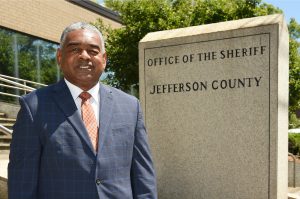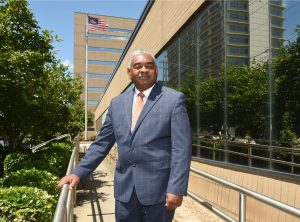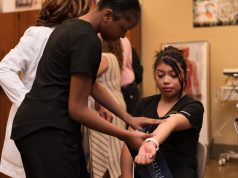By Erica Wright
The Birmingham Times
In Alabama, about a third of inmates return to jail within six or seven months of being released. During his campaign for office, Jefferson County Sheriff Mark Pettway said he wanted to do something about those numbers—and he has.
Shortly after becoming sheriff three years ago, Pettway launched the Renewed for Reentry Program, an initiative aimed at making Jefferson County jail inmates employable upon release.
“Recidivism here is at a high rate, and we want to stop those inmates from repeating offenses and coming back to the county jail,” said Pettway.

If inmates do not stay in these jobs for a full year once released, they will return to the jail to complete their sentence. So far, that has not been the case.
“They have done a good job of staying in these jobs and staying out of jail, so it has been working pretty good,” said Pettway.
The program’s first class graduated in November 2019. The second class was temporarily halted due to the COVID-19 pandemic, but the program came back online in March and is working toward completion.
“Anything we can do to keep people out of jail, we would like to do that because you’re looking at housing them, feeding them, providing health care—and all of that takes taxpayer money,” Pettway said in a recent interview. “If we can find a way to get them into jobs and help them become productive and take care of themselves and their families, it will save taxpayers a lot of money and cut down on the recidivism rate.”
The Renewed for Reentry Program works with those held on nonviolent offenses.
“Once we take these inmates before the judge, the judge is able to sentence them to the program. Upon completion, the judge can release the [inmates], who can then go out and work their jobs,” said Pettway, who explained that the program is implemented through three phases: Ready to Work, Training to Work, and Graduation and Release.
All instruction, training, and even job interviews are done on site at the county jail. Skills and assistance offered include job preparation, comprehensive case management, career exploration and planning, legal assistance, and assistance to link inmates with social services designed to help them transition back into their communities.
Pettway formed a coalition to make sure the program and inmates got as much support as needed: “The first time we did it, [in 2019], we partnered with Lawson State Community College, along with the Dannon Project, and we worked it out with the judges, district attorney’s office, and the public defender’s office to put these inmates into a program through which they were able to get an education and job skills.”
The Dannon Project is a 501(c)(3) nonprofit that helps unemployed or underemployed at-risk youth and nonviolent returning citizens reentering society, and the partnership is vital, the sheriff said.
“[The Dannon Project] is doing the whole reentry process,” he said. “They are teaching the Ready to Work skills program, helping inmates get their GED, and placing inmates in jobs,” said the sheriff. “[Inmates] get the training and skills [at the county jails], and at the end of the program they get employed. The Dannon Project will pay for the first three months of employment, and from there the [Dannon Project] will monitor [former inmates] for a year to make sure they stay in these jobs.”

The Renewed for Reentry Program was launched originally in August 2019 with 19 inmates who went through job skills training and interviews on site at both Jefferson County jail sites in downtown Birmingham and Bessemer.
The first cohort of the program was about 12 weeks. Just when Pettway was getting ready to start the second class, “we had to shut the program down because the courts were shut down [because of COVID-19], and we had to limit the number of people coming in and out of our facilities,” he said. “We didn’t do a virtual component. That could have been something we might have been able to do, but because of quarantine and everything being limited with space we shut the program down until this year.”
This year’s class began in March with 21 inmates who now go through an eight-week course that has been expanded to provide additional job-training skills, such as how to dress for success, correctly fill out forms, and prepare for jobs.
“The [program also ensures that] they are registered to vote and have identification,” Pettway said. “We want them to be able to participate in their civic duties, so we make sure they have everything they need before they leave [the Jefferson County jails].”
Employers have included those in the food, automobile, transportation, and labor industries, among others, and the program has generated a lot of positive feedback.
“[Inmates] all over are asking to be in the program. They want opportunities to get training and be placed in positions of employment,” Pettway said. “Those who are in the program are doing good. They are excelling in the work they have been given each day and are showing that they can be reliable employees. The Dannon Project will continue to monitor [participants], and once we get a year down the road, we’ll be able to look back and see how many were successful because we will know if anyone has returned to jail or lost their job at that point.”
The Renewed for Reentry Program provides benefits not only for participants but also for the community.
“This helps fight crime because those individuals who were in the community maybe robbing or using drugs will no longer be doing that and will now have jobs,” Pettway said. “We’re changing things from the inside. They’re being renewed to go back out and reenter society.”
Click one of the links below to read more Second Chances stories.
‘God arrested me:’ How Derrick Ervin Went From Life Sentence to Life Saver





